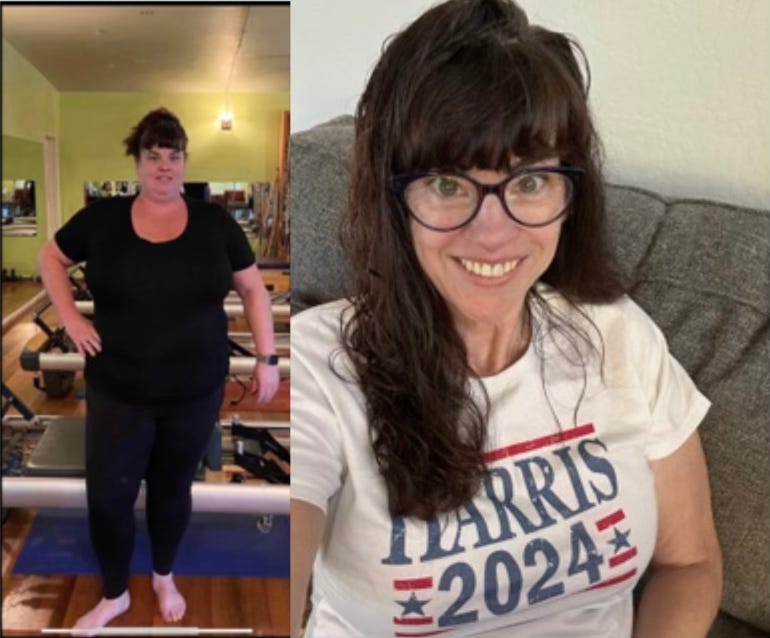“Overnight, the alcohol noise was gone.”
A patient describes how Ozempic and Mounjaro ended her drinking after all else had failed.
At CASPR, we’re working to address the addiction crisis at scale by advancing breakthrough medicines, research, and policy. We have been particularly focused on the near-term possibility of GLP-1s (Ozempic, Wegovy, Mounjaro, and Zepbound) to revolutionize addiction treatment. The scientific evidence is growing every month and the experiences that patients and providers are reporting are incredible. We recently wrote about how addiction doctors are beginning to use GLP-1s as a central component of their practice.
Here’s what it’s like from a patient’s perspective. Melissa Adams talks about how going on Ozempic and Mounjaro quieted her alcohol noise.
If you’d like to tell your story, please reach out.
__
I was working for an airline in the drug abatement division, flying all over the country doing drug testing for pilots. I was a full blown alcoholic, drinking close to a fifth of rum during the weekdays. I tried stopping, going to outpatient and inpatient rehabs and AA as well, but nothing worked.
I was depressed and ballooned to more than 300 pounds. My PC diagnosed me with diabetes and recommended gastric bypass surgery. My surgeon prescribed Ozempic. He said something about how it might help with cravings but I didn’t think much about it beforehand.
Post-surgery, I noticed a lack of cravings right away. I wasn’t hungry. I used to think about food all the time. The food noise was gone.
I talked to my husband. I told him I had no idea people live without thinking about food or alcohol all the time.
I also did not crave drinking. Before was a constant stream of thoughts like “how am I going to get a drink tomorrow?” “Can I go to the store?” “Will spending money be noticeable?” “Can I hide it in the grocery bill?” You think about everything.
Overnight, that alcohol noise was gone, too. When I started taking the medicine, I didn't have to make an effort not to drink anymore because I just wasn't thinking about it. I talked to my husband. I told him I had no idea people live without thinking about food or alcohol all the time.
I took Ozempic for about a year and was down to about 185 pounds. My weight loss stagnated but I was content with being under 200 pounds. Still my goal weight was 155 pounds, and my doctor suggested I switch to Mounjaro in January. She said it targeted different hormones. I said I would try it. Let me tell you, I thought Ozempic was the end all be all, but I love Mounjaro. I thought I didn't think about alcohol on Ozempic; it’s even more dramatic on Mounjaro. I never want to go off it.
I think I could have a glass of wine and stop at one glass. I haven’t done so, but with the medication I believe I could have been a normal drinker.
I had never been able to focus on doing one thing. I would go from one thing to another to another. I couldn’t stick with anything. My only habit was being bored and wanting to drink. Now I’m able to have hobbies. I’ve picked up weaving, and I’m actually flying to Santa Fe to attend a Navajo weaving workshop tomorrow.
I like the feeling of drinking, but I didn't want it to be such an overwhelming part of my life. I wanted to be a normal drinker—have a drink or two and stop. I couldn't do that. Now, I think I could have a glass of wine and stop at one glass. I haven’t done so, but with the medication I believe I could have been a normal drinker. I won’t do that because my alcoholism affected my family so deeply. I would never want them to see me take a drink again. It would scare them.
Not thinking about drinking anymore is a gift from God. I'm an atheist, but it really is. It'll give me another 30 years of my life where I'm content and happy. I feel like I have a whole new life.
We will be publishing more patient and provider stories soon. Please be in touch if you are interested in sharing your story.
And read more of our articles if you are curious about the science and policy of breakthrough addiction medicines.




Now, this is really becoming exciting in a very giddy way. I'm a clinical psychologist and I sometimes work with SUDs patients. I therefore appreciate the potential value of this creeping pharmacological revolution in addiction management. But the sceptic in me is also screaming for cases in which GLP-1S was a failure. There're bound to be such cases, right? And we need to understand why they didn't work. Thanks for what you do on this newsletter .
Melissa, I'm so happy for you. I've had the same experience. Like you, for the first time in my life I feel like I could have a couple of drinks without going overboard. I would never ever try it because I put my family through too much, not to mention the long-term effects it's had on me.